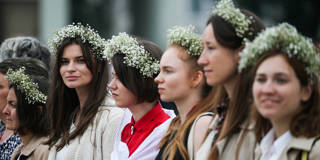Each new day of protests works against Russia’s long-term interests in Belarus, and fuels distrust and hostility toward the Kremlin. Russian President Vladimir Putin should openly express solidarity with Belarusian society instead of cautiously supporting President Alexander Lukashenko.
MINSK/MOSCOW – Huge protests have swept Belarus since Aleksandr Lukashenko fraudulently claimed to have won 80% of the vote in the August 9 presidential election. The country’s future may now hinge on Russian President Vladimir Putin.
Lukashenko has ruled Belarus since 1994, not without popular support, even gaining the sobriquet Batka (“father”). But in recent weeks, enraged citizens from all walks of life – including factory workers, doctors, and journalists – have been demonstrating and striking, and young women have suddenly become the face of the opposition. Svetlana Tikhanovskaya, the former teacher whom many believe won the election, is not organizing the protests, but her resolve is channeling the widespread discontent.
Belarus, which has been stable for most of Lukashenko’s rule, has often seemed to visitors like a neverland between Europe and the former Soviet Union. The country borders three European Union member states (Latvia, Lithuania, and Poland), and its capital, Minsk, has clean streets and comfortable cafes. But shopkeepers sell bronze statues of Stalin and mugs emblazoned with the hammer and sickle and “Long Live USSR.”

MINSK/MOSCOW – Huge protests have swept Belarus since Aleksandr Lukashenko fraudulently claimed to have won 80% of the vote in the August 9 presidential election. The country’s future may now hinge on Russian President Vladimir Putin.
Lukashenko has ruled Belarus since 1994, not without popular support, even gaining the sobriquet Batka (“father”). But in recent weeks, enraged citizens from all walks of life – including factory workers, doctors, and journalists – have been demonstrating and striking, and young women have suddenly become the face of the opposition. Svetlana Tikhanovskaya, the former teacher whom many believe won the election, is not organizing the protests, but her resolve is channeling the widespread discontent.
Belarus, which has been stable for most of Lukashenko’s rule, has often seemed to visitors like a neverland between Europe and the former Soviet Union. The country borders three European Union member states (Latvia, Lithuania, and Poland), and its capital, Minsk, has clean streets and comfortable cafes. But shopkeepers sell bronze statues of Stalin and mugs emblazoned with the hammer and sickle and “Long Live USSR.”